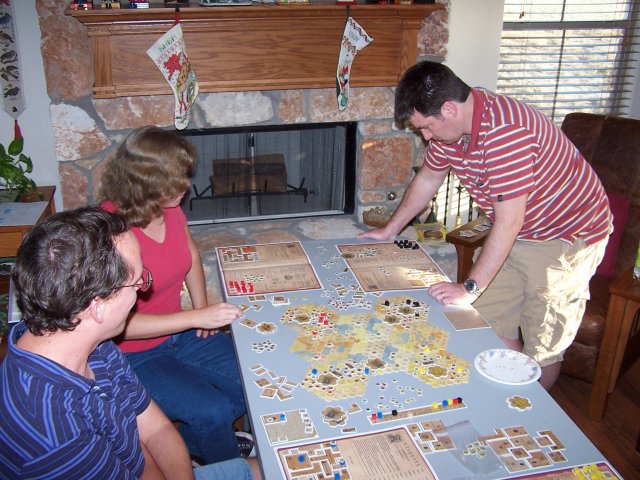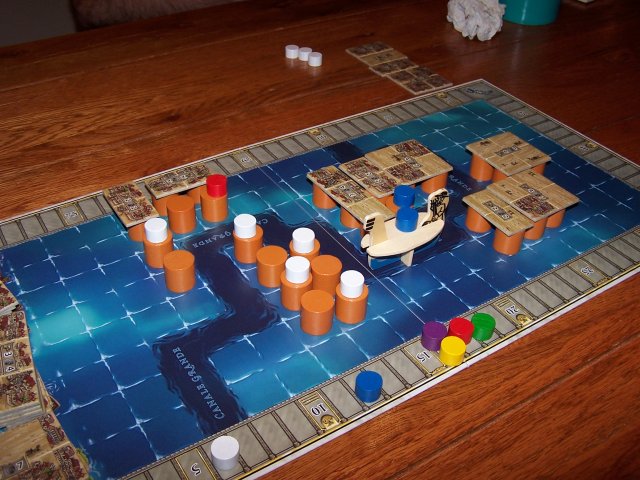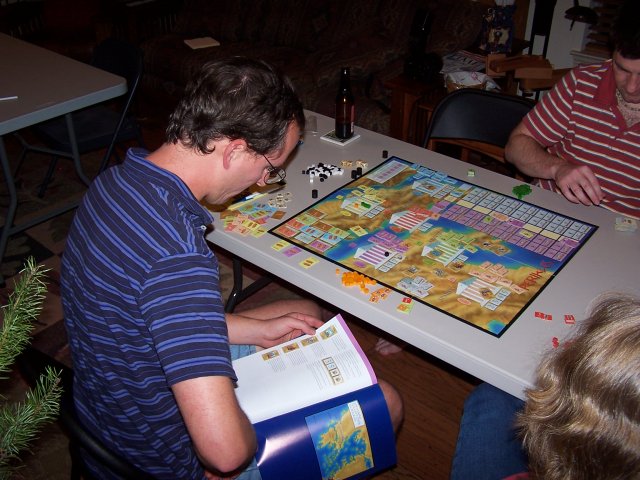
January 3, 2007Games Day Report for December 16, 2006by Susan Rozmiarek
AntiquityThis game has been played several times at my house and I've been avoiding it all costs. In fact, I've been ignoring all the raving and putting my fingers in my ears while chanting, "I'm not listening." Why? Because I knew I would love it and >$100 for a single game is just too painful. Besides, I have my beloved copy of Roads & Boats. Do I really need a similar game? Then I saw a "ding-n-dent" copy for a paltry $75 at GameSurplus. I caved. It was my birthday after all. Cha-ching! Happy birthday to me!Wow. Oh, WOW. Like Roads & Boats, this is my very favorite type of heavy game. Give me a set of building toys and send me off into a corner to play and see what I can do with them. Give me lots of puzzles and choices but leave me alone until I've made some progress. I loved choosing my winning conditions and then having to tailor my plan to meet them. I loved how I had to take time and resources away from my plan to manage the pollution and graves which were just relentless. I loved how the using up of land forced expansion and the eventual bumping up and competing for real estate with other players. Gush, gush, gush. I just loved this game. It IS similar to Roads & Boats but the planning in Antiquity is very different. Much of the focus in Roads & Boats is on planning an efficient transportation system. In Antiquity it seems to be on choosing what to build in your cities and then using them to effectively milk the surrounding landscape while expanding so as to never run out of resources. Excellent stuff, indeed. Will Antiquity be joining Roads & Boats on my list of Favorite Games of All Time? Time will tell. I do feel that I need to insert a warning here. Like R&B, Antiquity comes with a mountain of small chits that you'll be shuffling around every turn in a very fiddly fashion. It's long and it has a steep learning curve. It's pretty solitaire-ish and the player interaction is indirect. The box is huge and takes up a lot of shelf space. And of course, as I mentioned, it is quite pricey. All of these factors are definitely going to turn off a lot of folks. Die Säulen von VenedigAfter frying many brain cells with Antiquity, a lighter game was in order. We played this new Goldsieber game with a full complement of six players and it was rather fun. Like last year's Kreta from the same publisher, this game also has role cards that allow players to do different things when played. The game is about building the city of Venice. Wooden pillars are placed on the city board and then city building tiles are placed on top of those for victory points. Some pillars are marked as owned by players when they are built and can yield victory points for the owner when another player builds atop them. The cards do various things - add city tiles to your supply, build city tiles, build pillars, score bonus points if a certain card is played by another player, destroy a building, etc. The mechanism is rather neat. Players simultaneously and secretly choose a card from their hand. The cards are revealed and each player executes his action in turn order and then passes his played card to the player on his left who adds the card to his hand. So, you can get an idea of what other players might do based on what you know is in their hand. Another neat thing is that certain character cards have a symbol on them which indicates that at the end of the round, the first player marker will be passed to the person on that player's left to start the next round.Timing was everything once this game got going. Playing the Builder card when you are late in the turn order is futile as you were sure to get hosed and have no available pillars by the time your turn comes around. I actually found the Beggar to be quite useful when I was last in the turn order. The beggar allows you to copy any character played (except the Spy) and so he usually gives you some choices. The bonus cards are rather fun to play. If there are a lot of empty pillars on the board, you can be fairly sure that Builders will be played and this would be a great time to play, if you have it, the Speculator card for six points if a Builder has been played. You could also play the Beggar, to imitate the Speculator if it and the Builder are played. I did love that Beggar! At any rate, the game was fun and I found it to be a bit more than just random guessing as you have enough information to predict somewhat what other players might do. I'm curious how it plays with fewer players. I imagine players will have more control which could be good or bad depending on whether you want to make this a light game or not. PeriklesSo now we get to a game that I just didn't like. Mark really wanted to give this new Martin Wallace game a try and he persuaded Jon and me to play. Jon had played it before and wasn't too keen but was willing and I wanted to see if it was a possible purchase. Wallace has had some solid hits with us like Struggle/Conquest of Empires and Liberté, but to be honest, his games don't hit the table very often because of the length and long, sometimes fiddly rules that need to be closely read again every time. We still have Byzantium and Princes of the Renaissance sitting unplayed on our shelves. So despite the glowing reviews, I wasn't sure if we really needed Perikles. Well, now I know that we don't. Thank you, Mark, for saving us about $40. I'll warn you about my discussion that follows. I was taught the game and have neither read the rules nor do I have access to them. So, I might call things by the wrong name. It's also possible that we missed a rule or two (or three or four). Our group excels in that!First I'll mention the things that I did like. I thought the overall idea of the game was neat. Each round (year?) has two phases. First players fight to be elected to be the leader of each of 6 cities in ancient Greece. The leader of each city gets control of the military forces of that city in the following phase in which battles between cities are fought to win victory point tiles. If one doesn't get control of any of the cities, all is not lost. That player will get to control the powerful Persians. Also, at the end of the game each city will be worth victory points which go down during the game when the city loses a battle. Each time a player is the leader of the city, they have a statue built in their honor. Each of these statues is worth the city's points at the end of the game. So, there will be certain cities you'll want to see defeated or victorious regardless of the battle tile points. So far, so good, right? Well, the game goes very wrong for me when you actually delve into the individual phases. You win control of cities through area majority control. The problem is, both the number of cubes (1 or 2) and the particular city in which you play them are based on a randomly drawn set of tiles and this is not a good time in the game to get hurt by luck-of-the-draw. What you achieve in this phase drastically affects your success in the next and sometimes the tiles available to you leave nothing meaningful to do. There are some nice nuances with electing leaders, but not enough to overcome the limitations of the tile draws. This whole phase was a little bland, I thought. I disliked the second phase even more. This consists of blind bidding and bluffing battles using the forces you control by allocating your forces tiles facedown opposite a battle tile that depicts the city being defended. After everyone has placed all their tiles, they are revealed and each battle is resolved. Brace yourself because here is where things get really fiddly. There are two types of units - land and naval. For most of the tiles, there will be a battle fought for each unit type in the order designated on the battle tile. You count up the value on the attacker's tiles of that type and compare it to the summed value of the defender's and consult a chart to see what each player has to roll on the dice to be successful. So now each side starts rolling against each other. For each success, that player gets a black, chunky wooden...thing. Once a player gets two of those black things, he wins this battle. He gets to carry one of the black things into the second battle with the other unit type where this whole process is repeated. This second battle alone decides who actually wins the war and gets the battle tile and its victory points. That first battle was just to determine which player gets a black-thing advantage in the real battle. What does this all represent? I'm not sure. The whole process seems very abstract and fiddly to me. I was longing for the map and amassing armies in Struggle of Empires and better yet, the unwieldy plastic sculptures and enormous map of the Eagle Games version. At least you feel like you're in a battle. I've glossed over the rules a bit (Okay, a lot) but you get the general idea. Despite the high ratings this game is getting, it is definitely not for me although it does have some neat ideas. Since I enjoy other games with pasted on themes, I'm not sure why it bothered me so much here. Nothing in the game really hooked me. I guess that it just seemed too boring and too abstract for what I wanted it to be, another Wallace game with a rich thematic feel and some new clever mechanisms. When you look at the ratings for Perikles on BGG, I'm obviously in the minority so perhaps I'm missing something. As a parting shot, I'll also add that I didn't care for the pastel color theme at all. Blech. There, so much for Pollyanna. Don't worry; I'm sure she'll be back in the next report. Posted by Susan Rozmiarek at January 3, 2007 5:15 PM Comments
You have piqued my interest in Venedig again. I re-read the rules, and it's now under consideration again. It's not well-received on BGG, but it's also not out in English yet. Posted by: ekted on January 4, 2007 3:56 PMYou have piqued my interest in Venedig again. I re-read the rules, and it's now under consideration again. It's not well-received on BGG, but it's also not out in English yet. Posted by: ekted on January 4, 2007 3:59 PMPost a comment
This page viewed E-mail Ed Rozmiarek with questions or problems concerning this page. Copyright © 2007, Ed & Susan Rozmiarek. |
 I've been feeling like the "Pollyana" of gaming lately where every day is sunny and all the games are excellent. Since much of my gaming lately has been with new gamers, I've been getting to play a lot of my favorite gateway games. I've also been picky about what new games I try and tend toward those that really appeal to me. So, I end up liking most of what I play. However, the weather has turned gloomy and rainy and my happy run of games hit a wall(ace). First though, you'll have to get through some more gushing.
I've been feeling like the "Pollyana" of gaming lately where every day is sunny and all the games are excellent. Since much of my gaming lately has been with new gamers, I've been getting to play a lot of my favorite gateway games. I've also been picky about what new games I try and tend toward those that really appeal to me. So, I end up liking most of what I play. However, the weather has turned gloomy and rainy and my happy run of games hit a wall(ace). First though, you'll have to get through some more gushing.  Also, I hope that my selection of games played this day dispels any rumors that I have become a "fluffy" gamer!
Also, I hope that my selection of games played this day dispels any rumors that I have become a "fluffy" gamer!

